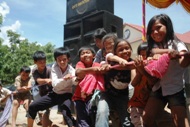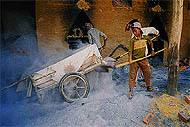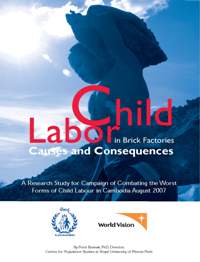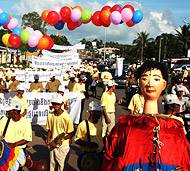Forced labour & debt bondage
Statement | Re-open STT’s Photo Exhibition and Hold Authorities to Account12 March 2024
We, the undersigned, are disappointed by the actions of the Sangkat Nirouth Police Station in Khan Chbar Ampov, Phnom Penh, which ordered the owner of Champei Garden Restaurant to stop displaying photographs that were part of an exhibition by Sahmakum Teang Tnaut (STT). The authorities provided no reason or justification for their actions.
The topic of the photo exhibition was Housing and Life , and it had opened on 25 February 2024. It aimed to highlight the ongoing concerns and challenges facing Cambodia’s urban poor communities, with the purpose of finding solutions.
20 November 2023
Debt bondage and child labour plague Cambodia’s brick factories, as decades of inaction by the Cambodian government and construction and real estate sectors have allowed these human rights abuses to continue unchecked.
Today, on World Children’s Day 2023, the Cambodian League for the Promotion and Defense of Human Rights (LICADHO) is renewing its call for all actors to immediately end these shameful practices. “Bound by Bricks: An Opportunity to End Debt Bondage and Child Labour in Cambodia’s Brick Factories" is a report based on information documented by LICADHO from 21 brick factories across Kandal province and the capital Phnom Penh.
20 November 2023
International brands’ garment waste is contributing to human rights and environmental harms in Cambodia’s brick factories. During visits to brick factories from April to September 2023, LICADHO found pre-consumer garment waste this year at five operational and two permanently closed brick factories. These factories in Phnom Penh and Kandal province burnt pre-consumer garment waste to fuel brick kilns. LICADHO found waste marked with 19 international brands as evidenced by the photographs below.
10 March 2022
We are deeply disturbed by reports of widespread human trafficking into Cambodia leading to forced labour, slavery and torture at compounds across the country. Dozens of media reports and numerous victim accounts collected by local and international organisations suggest that thousands of people, mostly foreign nationals, are entrapped in these situations. We call on the government to take meaningful and coordinated action to respond to these gross human rights violations, and to investigate alleged complicity between some government authorities and the criminal enterprises.
12 June 2019
Today, LICADHO marked World Day Against Child Labour by organising community events in two brick factories in Kandal province: Tboung Pich in Mukh Kampul district and Kheng Hok in Ksach Kandal district. Around 200 people attended the events, including brick factory owners, workers, and children. The events sought to raise awareness in the brick production sector about the criminality and consequences of employing child labour and debt bondage, and the importance of prioritising workplace safety.
The events were organised at the two brick factories to ensure that both factory owners and their employees were brought together to have a better understanding of the risks of employing child labour and the use of debt-bonded labour. Presentations were made and leaflets were handed out to the owners and workers about the legal provisions in the Labour Law and Cambodia’s commitments to the International Labour Organisation’s Convention 182 to stop the worst forms of child labour.
2 December 2016
On the International Day for the Abolition of Slavery, LICADHO publishes its report “Built on Slavery: Debt Bondage and Child Labour in Cambodia’s Brick Factories” which presents evidence of the widespread use of contemporary forms of slavery in Cambodia’s brick manufacturing industry. It finds that despite the existence of comprehensive and long-standing legislation criminalizing the use of debt bondage and prohibiting child labour, competent authorities are making no efforts to eradicate them and are in fact enabling their survival.
2 December 2016
To accompany publication of the report “Built on Slavery: Debt Bondage and Child Labour in Cambodia’s Brick Factories” LICADHO is releasing this photo album which shows the different elements of the brick-making process and the living and working conditions of the adults and children who make the bricks.
12 June 2015
To commemorate June 12 World Day Against Child Labour (WDACL) 2015, LICADHO is publishing personal testimonies of five children and one adult who work in Cambodian brick factories.
These testimonies provide a glimpse into brick factory child labour, which is considered to be one of the worst forms of child labour, and demonstrate the negative effects of brick factory child labour on children.
11 June 2014
LICADHO will mark World Day Against Child Labour 2014 by organizing community events in two locations: Sangkat Dang Tung, Koh Kong; and Stung Haov district, Preah Sihanouk. The aim of these events is to raise awareness of child labour in various sectors and to encourage communities to raise critical questions, and offer suggestions to local authorities on how to end child labour. World Day Against Child Labour officially falls on June 12.
19 December 2013
Sothea, a child laborer, has spent most of his 16 years living and working in a brick factory compound in Ba Kaing Commune. He is one of a shockingly high number of children in Cambodia aged 5-17 who work as laborers and receive little to no compensation. Despite facing limited opportunities and resources, Sothea is determined to make a better life for himself and for his family. The first and most important step, he says, is getting a good education.
31 August 2011
Cambodia's recently-enacted sub-decree on migrant labor is a "dismal failure" for workers and should be scrapped in favor of a new law, according to an analysis by LICAHDO.
LICADHO has documented horrific abuses in the industry over the past two years, including the use of debt bondage, deaths inside pre-departure training centers, the recruitment of underage workers, illegal detention of workers, the facilitation of forged documents, and the failure to pay salaries. None of these areas are addressed in the new law. Worker protections, meanwhile, are vague, limited in scope, and in many cases less stringent than the 1997 law it superseded, Sub-Decree 57.
9 June 2011
I gave up school for a job as domestic worker when I was very young. I earned just 100,000 Riels (approximately USD 25) per month, which was already advanced by my mother. In addition to housework, I was also assigned to sell fried crickets at night at various beer gardens and bars. Just three months after I came to work for the family, the male house owner raped me while I was in the house alone. I was subsequently raped on further occasions, and intimidated into not disclosing the information. The owner also gave me contraceptive injections.
- A 13-year-old girl from a remote province fell into bonded labour as a domestic worker for a family.
LICADHO and World Vision Cambodia will mark World Day Against Child Labour on June 10 and June 12 by organizing two community events to raise public awareness and actions on the worst forms of child labour.
18 June 2010
In June 2010, LICADHO helped organized two events to promote the rights of children in Cambodia. International Children's Day was celebrated on June 1st, with the slogan "Community Without Trafficking." The World Day Against Child Labour occurred on June 12th under the theme "I protect the children, do you?"
The two events are celebrated every year to highlight children's rights and promote prevention and elimination of the worst forms of child labor. The aim is also to draw public attention and increase awareness of children's rights violations.
16 June 2010
“When I was putting the soil into the mixing machine, the soil was stuck, so I tried to push it in, suddenly the machine caught my arm inside. After the incident, I returned to hometown to live with my single father and three younger brothers. I need to look after all of them because my father is mentally weak. I am so hopeless and my dreams are also destroyed, as I am disabled and uneducated. I don’t know what I can do besides tending cows every day. I left school when I was in grade 1 before I went to work in the brick factory.”
A 16-year-old boy who lost his left arm while he was working in a brick factory.
LICADHO and World Vision Cambodia will mark World Day Against Child Labour on June 12, 2010, by organizing a street march and local concert in Sangke District, Battambang. The event aims to sensitize the public on the issues of child labour, particularly on child labour in brick factories. The event will take place between 3 p.m. and 9:30 p.m.
12 May 2008
Sophal* was only six when he became a child brick factory worker. The rest of his family has spent over five years working in the brick factory. Together, the family of five earns less than US$25 per month. The work is hard, and the children often get sick. The job involves repetitive lifting, carting and drying of clay, and hauling brick blocks in and out of hot furnaces.
On May 7, World Vision Cambodia (WVC) and LICADHO launched a joint research report "Child Labor in Brick Factories - Causes and Consequences" at a workshop in Battambang city. The research, conducted in July 2007, aimed to identify causes and consequences of child labor in brick factories in the surrounding areas of Battambang city.
8 May 2008
As part of the campaign against the worst forms of child labor for the wellbeing of Cambodian children, LICADHO and World Vision Cambodia have commissioned the research team, led by Dr. Poch Bunnak, to conduct a study on children working in brick factories. The study was conducted in July 2007 to identify the causes and consequences of child labor in brick factories in Battambang and Sang Ke districts, the surrounding areas of Battambang
provincial city.
Data were collected using interviewer-completed questionnaires from three main sources (132 child workers, 43 parents, and 15 brick factory owners or managers) from 26 brick factories. It is estimated that between 400 and 500 children work daily in these brick factories during the high labour-demand season.
29 August 2007
Although Cambodia has seen rapid economic growth in recent years, it is still one of the poorest countries in the world with most of its citizens living in poverty. The reality of poverty is that it is indiscriminate and affects not only adults but also children. This sadly forces many young children to engage in domestic and manual labor to support their families, with a large proportion working under severe conditions.

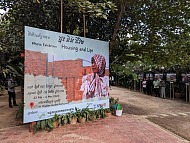

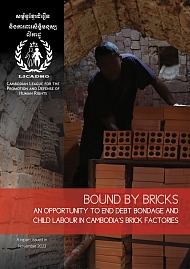
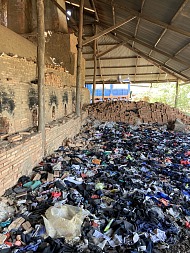
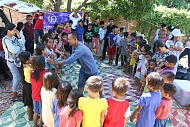
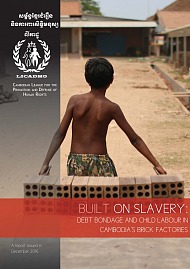
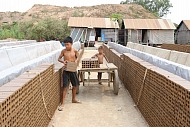
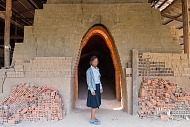
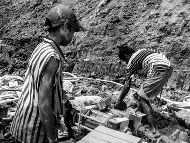
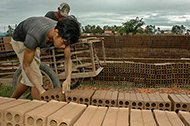
.JPG)
